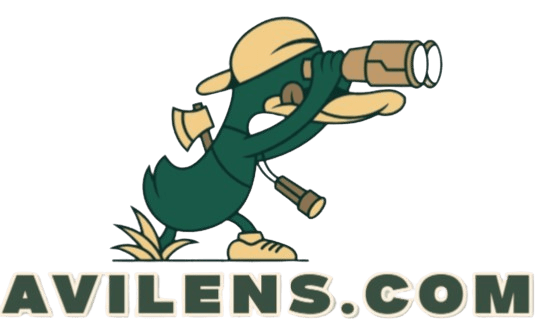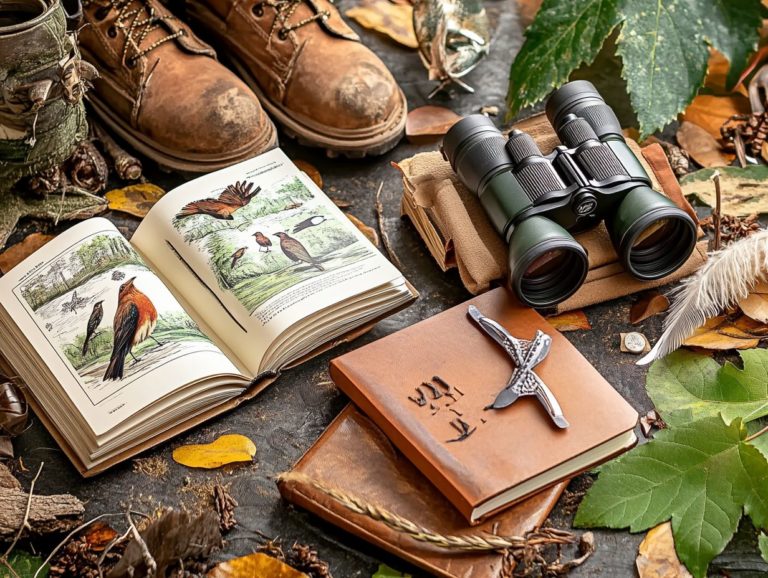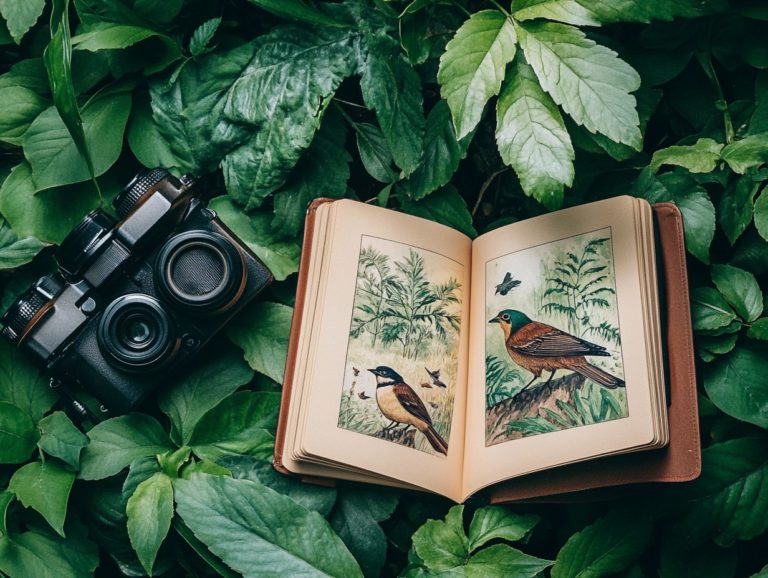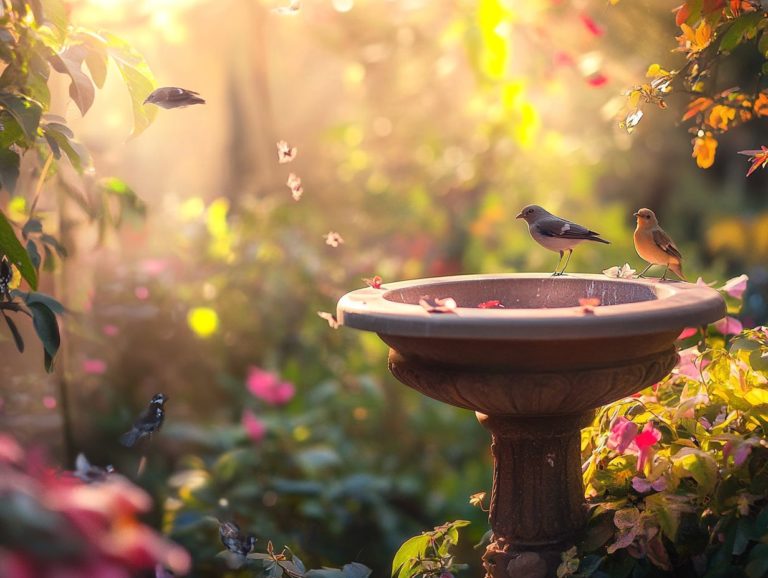Why Is Keeping a Bird Watching Diary Important?
Bird watching is not only a relaxing hobby but also beneficial for physical and mental health. The advantages of observing birds, ranging from stress relief to improved focus, can significantly enhance our lives.
Keeping a bird watching diary can further maximize these benefits by allowing enthusiasts to record their sightings and behaviors while helping protect birds.
This article explores the importance of maintaining a bird watching diary, offers creative ideas and tips for its implementation and use, and discusses ways to share the diary with fellow bird watchers. Whether experienced or novice, readers will discover how keeping a record can enrich their bird watching experience.
Contents
- Key Takeaways:
- The Benefits of Bird Watching
- Why Keep a Bird Watching Diary?
- How to Start a Birdwatching Diary
- Making the Most of Your Bird Watching Diary
- Sharing Your Diary with Others
- Frequently Asked Questions
- What is the purpose of keeping a bird watching diary?
- How does keeping a bird watching diary benefit me?
- What information should I include in my bird watching diary?
- Can I use a digital diary for bird watching?
- Why is it important to keep track of my bird watching experiences?
- How often should I update my bird watching diary?
Key Takeaways:
- Track your sightings and behaviors to deepen your appreciation of the birds around you.
- Document your observations and contribute to a bigger cause in bird conservation.
- A bird watching diary enhances the overall experience, allowing you to reflect, learn, and connect with others through shared sightings.
The Benefits of Bird Watching
Bird watching is a fascinating and creative activity that offers numerous benefits for both physical health and mental well-being. By connecting with nature through this pastime, individuals can document their wildlife sightings, enhance their observation skills, and maintain a written record of their bird watching experiences.
Observing species like the American Robin or participating in initiatives such as Project FeederWatch, which tracks birds visiting feeders, allows individuals to deepen their relationship with the environment. Birdwatching also boosts creative thinking by encouraging participants to keep a nature journal where they can write and draw their observations.
Physical and Mental Health Benefits
Bird watching offers significant physical and mental health benefits, including improved fitness levels and reduced stress through the calming effects of nature. One of the primary advantages is enhanced physical health.
Bird watching is beneficial for the cardiovascular system, as enthusiasts often walk, hike, or travel to observe various bird species. This activity fosters a close connection with the environment. The steady pace of walking encourages mindfulness, allowing individuals to notice the sights and sounds around them.
Such active engagement helps alleviate anxiety and enhances mental clarity. Keeping field notes further enriches the experience; recording daily observations not only serves as a personal record but also encourages reflection on encounters with avian wildlife, deepening one’s understanding and appreciation of the natural world.
By offering both physical and mental health benefits, bird watching nurtures a healthy connection between the two.
Why Keep a Bird Watching Diary?
Bird watching diaries are essential for enthusiasts as they facilitate the tracking of sightings and behaviors, fostering a deeper appreciation for birds and their habitats.
By regularly documenting wildlife observations, bird watchers can record their personal experiences while also contributing valuable data to scientific research initiatives and projects like eBird.
Additionally, maintaining a personal record nurtures the natural curiosity and creativity of bird watchers, enhancing their overall bird watching experience.
Don’t miss out on the amazing experiences waiting for you in bird watching!
Tracking Sightings and Behaviors
Tracking the sightings and behaviors of birds is essential for maintaining a successful birdwatching diary. It provides deeper insights into patterns of bird behavior while enhancing your birdwatching skills.
Field Guides: These books and reference materials are essential for both amateur and professional birdwatchers. They improve the accuracy of bird identifications. While field guides are particularly beneficial for novices, they contain detailed illustrations and descriptions that aid in the quick visual recognition of common species.
Observational Strategies: Birdwatching diaries are important tools for tracking specific characteristics and behaviors. Keeping a dedicated journal to record sights, sounds, and behaviors enables observers to track changes in bird numbers, nesting patterns, migration routes, and the effects of habitat loss over time. Including sketches and photographs in your diary can further document bird behavior and interactions, making this information available to other enthusiasts and scientists.
By combining the use of field guides with observational strategies, you can adopt a comprehensive approach to tracking and enjoying birdlife.
Documenting Conservation Efforts
Birdwatching diaries play a significant role in conservation efforts by linking individual observations to broader environmental initiatives focused on preserving wildlife. This practice enhances awareness and appreciation of birds while enabling participants to engage in meaningful citizen science projects. Citizen science means that regular people can help scientists by collecting data, such as Project FeederWatch.
By documenting which birds you see, their locations, active times, and feeding habits, birdwatchers generate valuable data that researchers need to monitor bird populations and their habitats. Scientists utilize this data to identify trends and correlations, gaining insights into how environmental changes are occurring.
How to Start a Birdwatching Diary
To start a birdwatching diary, follow these steps:
- Pick a format that suits you
- Use the appropriate tools for birding
- Keep a record of your observations
Starting a birdwatching diary is an exciting way to explore nature and document your discoveries! A well-structured diary can enrich your birdwatching experiences, whether you choose to include sketches and photographs or prefer a more conventional writing style.
Choosing the Right Format
The format you choose for your birdwatching diary significantly influences how you record your observations and experiences. This decision also affects the enjoyment you derive from the activity.
For instance, opting for a digital notebook offers advantages in terms of accessibility and searchability, making it easy to locate specific entries. On the other hand, using a traditional paper notebook provides a tactile pleasure from writing by hand, which can be particularly enriching when immersed in nature.
Combining text, sketches, and photographs creates a multi-dimensional record that is enjoyable to create. Birdwatchers should embrace creativity in customizing their diaries, selecting a format and style that they find enjoyable, transforming each entry into a unique work of art.
Tips for Consistent Recording
Birdwatching diaries should include tips for consistent recording that foster curiosity and ensure that observations are both accurate and meaningful. Establishing a regular routine is essential; designate specific days and times each week for entries to transform journaling into a practice rather than an afterthought.
Using prompts can stimulate new thoughts and lead to fresh observations, promoting a more dynamic approach to documenting your experiences. Encouraging creativity by combining written notes with drawings enhances entries and deepens your connection with nature.
By balancing consistency and curiosity, anyone can elevate their journaling practice, transforming simple observations into a rich tapestry of experiences that beautifully captures the essence of the natural world. Don’t wait—start your birdwatching diary today to unlock a world of discovery!
Making the Most of Your Bird Watching Diary
Properly using a bird watching diary can enhance your bird watching experience and strengthen your relationship with nature. By reflecting on previous observations and recording new ones, you can cultivate a deeper connection with birds and their habitats.
Documenting patterns in bird behavior and revisiting the joy of old entries from past seasons fosters a lifelong sense of curiosity and creativity.
Using Your Diary to Enhance Your Bird Watching Experience
Keeping a bird watching diary encourages creativity and deeper reflection on your observations. By documenting specific details such as species, behavior, and environmental changes, observers can sharpen their observation skills over time.
Reviewing past entries can reveal trends in bird behavior and how weather or seasonal changes may impact migratory patterns. Reflecting on your entries inspires new adventures and helps enthusiasts set specific goals for their next bird watching activities.
Each entry enriches the overall experience, transforming casual observation into a more enlightening and fulfilling pursuit.
Sharing Your Diary with Others
Sharing your bird watching diary fosters a sense of community among bird watchers and enriches the overall birding experience.
By engaging with fellow bird enthusiasts through avenues like Bird Journal Clubs, you can exchange observations and record wildlife sightings together. This deepens your curiosity and appreciation for nature.
This sense of community builds relationships and supports conservation efforts.
Connecting with Other Bird Watchers
Connecting with fellow bird watchers expands your knowledge and experiences. It fosters a vibrant community centered around nature journaling and bird watching.
By participating in local bird watching organizations, enthusiasts can join field trips, workshops, and discussions that deepen their understanding of various species and habitats.
Using online platforms or social media, like dedicated Facebook groups or Instagram pages, allows bird lovers to forge relationships where they can exchange advice, share photos, and discuss recent sightings.
These interactions enhance individual experiences and cultivate a community that encourages all members to explore new bird watching locations and share valuable resources.
Engaging with the bird watching community nurtures a collective commitment to and appreciation for the beautiful intricacies of the natural world.
Contributing to Citizen Science Projects
Join citizen science projects like eBird and Project FeederWatch. You’ll contribute to vital research and gain insights into local bird populations! By inputting information from your bird watching journal, you enhance your understanding while providing valuable insights that can significantly influence scientific studies and conservation efforts.
This data helps scientists in monitoring bird migration patterns, assessing population health, and evaluating the impact of climate change on bird habitats. As you document your observations, you help create a broader narrative of biodiversity conservation, demonstrating how local actions can drive substantial global change.
Encouraging more people to join these efforts fosters a community of informed citizens dedicated to wildlife conservation and the protection of biodiversity for future generations.
Frequently Asked Questions
What is the purpose of keeping a bird watching diary?
A bird watching diary lets you record your exciting observations and experiences. It serves as a personal log of your sightings and allows you to track changes and patterns over time.
How does keeping a bird watching diary benefit me?
Keeping a bird watching diary benefits you in many ways. It helps improve your bird identification skills, allows you to contribute to citizen science projects, and provides a way to look back on memorable bird watching moments.
Grab your diary today and start your adventure in the wonderful world of bird watching!
What information should I include in my bird watching diary?
Include the date, time, location, and weather of your bird watching trip.
Note the species you saw and any fascinating behaviors or observations!
Can I use a digital diary for bird watching?
Absolutely! You can use a digital diary for bird watching. There are many apps and websites available that let you record your sightings and track your bird watching adventures.
Why is it important to keep track of my bird watching experiences?
Keeping track of your bird watching experiences helps you notice changes in bird populations and behaviors.
It also allows you to remember and reflect on your personal bird watching journey!
How often should I update my bird watching diary?
It’s best to update your bird watching diary after every trip to ensure accurate and detailed entries.
You can also update it at the end of each week or month if you prefer!






